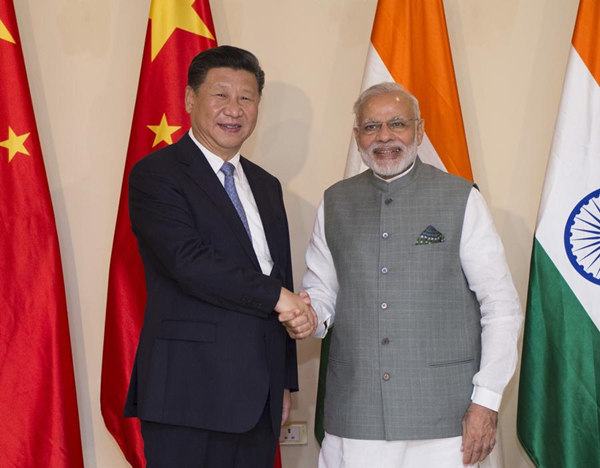 |
|
Chinese President Xi Jinping meets with Indian Prime Minister Narendra Modi. [Provided to China Daily] |
The 8th BRICS Summit in Goa, India, from October 15-16 came at a time when some of its member states, especially Brazil and South Africa, are facing economic turmoil. This is in stark contrast to a decade ago in 2006, when the group was set up, and all members (Brazil, Russia and India) were in robust economic shape.
While there is no doubt that since then the organization has made some impressive achievements, such as setting up of the New Development Bank (NDB) formerly referred to as BRICS Bank, which is headed by former Indian banker KV Kamath. The bank has already lent more than $800 million for projects that will promote clean energy. The president of the NDB made some significant points on the sidelines of the summit.
First, in recent years member states have contributed towards generation of global wealth.
Second, the level of investment required in infrastructure is a mammoth $1.5 trillion and BRICS will play an important role in the area. Kamath said: ”Infrastructure alone has $1-1.5 trillion a year globally – all the multilateral banks put together can do maybe 15 percent of this."
Third, there is immense potential for cooperation between member states. The NDB is likely to scale up operations and its staff will be raised to 300 over the next three years. A regional office will also be set up in South Africa. Fourth, he spoke in favor of an independent rating agency for BRICS.
Apart from economic problems afflicting certain countries, it is tough to ignore geo-political differences between some of the member states. Yet, ties between India and China, as well as India and Russia, are important and the leaderships of all countries seem to realize this.
The official statement following the meeting of President Xi and Indian Prime Minister Narendra Modi mentioned not just cooperation in railway projects and industrial parks, but also multilateral forums such as the Shanghai Cooperation Organizations and the East Asia Summit.
The Indian prime minister spoke in favor of greater communication between both sides and their responsibility in converting the 21st century into an Asian Century.
While some contradictions in any group are natural, it is important for BRICS, which comprises almost half of humanity, to find common ground in the economic sphere, and to ensure that strategic differences do not relegate the group to the sidelines.
In this context, it is important to give greater importance to business linkages between all these countries, and the trade fairs were an important attempt. Currently intra-BRICS trade is estimated at $250 billon, and it needs to be given a further fillip. Modi while addressing the BRICS business council said that members should target $500 billion by 2020.
Apart from this, NDB can also take the lead by investing in areas such as infrastructure and health in Africa. This will send a clear message that member states are willing to take a lead role in pushing economic growth and development in the region.
BRICS members can also explore cooperation in areas like health, education which will be mutually beneficial. It is also imperative to give a fillip to people-to-people contact, areas like tourism, education health and joint research can play a role in binding the group together. Modi while addressing the council said: “The scope of our partnership today stretches from agriculture to industry and innovation; trade to tourism; environment to energy; films to football; skill development to smart cities; and from fighting corruption and money laundering to securing our societies.”
The key for all member states is to not let differences distract the organization from its key objectives. Instead, the success of this organization should create incentive for member states to reduce their differences. Yet, a firm approach needs to be adopted towards issues like terrorism which are a global threat.
At a time when the developing world is emerging as the engine of growth, it is time that member states of BRICS show perspicacity and foresight in finding common ground. The onus is on all member states to ensure the relevance of BRICS, and to send a message to the naysayers that this is not just a fancy acronym.
Tridivesh Singh Maini is a New Delhi-based policy analyst associated with The Jindal School of International Affairs, Sonipat.